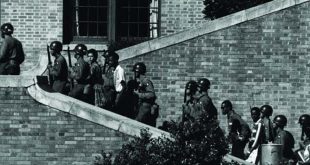Viewed from a political perspective – and there is no other applicable standard to assess the operations of the Hague Tribunal – the appellate level vindication of the role of Croatia and its Western sponsors in the deadly and destructive “Operation Storm” in 1995 could easily be anticipated. There is no need to quibble at this point whether the offensive against the breakaway Serbian region of Krajina meets the controversial and, after Srebrenica, thoroughly abused and devalued criterion for genocide. The bare facts – murder of 2,000 and expulsion of estimated 220,000 civilians – indicate that a war crime of major proportions took place on the watch of generals Gotovina and Markač, under the political auspices of the Franjo Tudjman Croatian government in Zagreb, and with ample material and logistical assistance of the main Western powers and their accessory agencies. Joint Criminal Enterprise would seem to be a made-to-order concept to describe exactly the consortium which conceived and implemented “Operation Storm”. One would naively think that the actors in this crime should be made to face the full extent of their individual and institutional responsibility for the mayhem and misery that they caused.
But not in the real world of the unfolding international system of “justice”. At least two important reasons come to mind why it is so and, in this particular case, the triple exoneration of the generals, of Croatia, and of the out-of-theater, non-Balkan principals of the Joint Criminal Enterprise was the only option for the corrupt dispensers of that brand of justice.
First, there is the pesky class action in America filed on behalf of the survivors of the Croatian generals’ military expedition in Krajina. Its ultimate legal conclusion may be uncertain. But disclosures which in the course of the litigation are bound to surface concerning the nasty role played by the agency comprised of “retired” US military officers (MPRI – Military Professional Resources Inc.) who generously shared their skills and experience with the forces under Gotovina’s and Markač’s command are sooner or later bound to hit the proverbial fan. Belated indications of preparatory meetings and planning sessions for “Operation Storm”, involving the highest levels of American intelligence and General Gotovina, at a Croatian military base in July of 1995, are bound to significantly broaden the circle of criminal responsibility at least in the public perception, whatever might be accomplished by legal maneuvering to thwart the successful progress of the class action suit filed by the victims. In the context of the developing legal situation in the United States, confirmation of the essential charges in the ICTY indictment of Gotovina and Markač (never mind theory of guilt and sentence modification, because the real issue pertains to raisons d’état and transcends particular individuals, even if they happen to be generals) would affect most adversely the combined interests of Croatia and, more importantly, the United States in this affair. Recalling Madeleine Albricht’s perceptive insight that those who pay the Tribunal are entitled to receive benefits in return, it is unsurprising that the Chamber majority exercised scrupulous regard for their paymaster’s obvious interests.
There is also another delicate political issue which, one assumes without the slightest hint of cynicism, might have played a part in shaping the majority’s legal analysis. Croatia will soon be admitted as a full-fledged member to the European Union. Many dire shortcomings have been overlooked in approving it as a country ready and fit in its quest to join “Europe,” whatever that means. But were heinous crimes, such as mass murder and ethnic cleansing under the aegis of its military and political leadership, to be judicially validated on the eve of its admission, even without “genocide” being thrown in, Croatia’s credentials would be gravely tarnished. The props might also be knocked from under the pedestal of the morally superior “European family of nations”, consenting to the admission of such a notoriously unworthy member. The appellate verdict was therefore entirely predictable in that sense also as a damage control mechanism primarily for the benefit of the continental members of the Joint Criminal Enterprise, who just happen to comprise the other pole of the Euro-Atlantic integration tandem.
Other incidental reasons for the appellate verdict could undoubtedly be cited, some perhaps particularly close to the heart of Judge Theodore Meron, who cast the deciding vote, but the aforementioned will suffice.
We should not, however, focus only on the less pleasant aspects of the news. The bright side deserves to also be noted.
First of all, following classical America wisdom that “when they give you a lemon, make a lemonade,” defense teams should squeeze the maximum from the ingenious arguments that were invented by the Appellate Chamber to rationalize its exculpatory conclusions in the Gotovina and Markač case.
The Chamber’s deep analysis of what constitutes indiscriminate shelling, for example, including meticulous consideration of the impact of such arcane factors as wind speed and air temperature, should not be discarded out of hand just for its frivolity. If it were applied with consistency, and equal vigor, in cases involving non-Croatian and non-Muslim defendants, it could significantly influence the outcome of controversial issues such as the shelling of Sarajevo and the Markale incidents. That was correctly observed already by Radovan Karadžić’s legal adviser Peter Robinson in his initial reaction to the Gotovina verdict.
The other encouraging aspect of the Chamber’s reasoning (assuming again a modicum of consistency in its application) is the strict constructionism it displayed in the treatment of the key issue of Joint Criminal Enterprise: “[T]he Appeals Chamber…considers that no reasonable trial chamber could conclude that the only reasonable interpretation of the circumstantial evidence on the record was the existence of a JCE for the common purpose of permanently removing the Serb population from the Krajina by force or threat of force”. Indeed. Since in the numerous Serbian cases where in the indictment JCE is alleged there is none but circumstantial evidence to support the charge, this is now a clear signal to trial and appellate chambers that the probative value of prosecution’s circumstantial evidence must henceforth exceed the benchmark set by the Gotovina and Markač case if it is to be judged as the “only reasonable interpretation”. For ICTY prosecutors that may now turn out to be a tall order in light of the persuasive but apparently failed JCE evidence in the Gotovina case which showed Gotovina prior to the operation sitting around the same table with Croatia’s military and political leadership. In the course of that meeting, President Tudjman was recorded announcing that the goal of the enterprise which they were gathered to bring to fruition was “to see the Serbs hit the road…”, a self-fulfilling prophecy because that is precisely what those who physically survived “Operation Storm” were massively made to do.
There is, finally, one more – and probably the most important single – benefit from this corrupt verdict. Dissenting Judge Pocar hit the nail on the head when he described it as being “devoid of any concern for justice”. The Gotovina appellate judgment therefore releases the Serbian side from any obligation to henceforth pay the slightest attention to the views of the Hague Tribunal. Concurrently, this judgment demolishes also one of the main arguments invoked by the Srebrenica lobby, that its claims derive validity from the fact of being enshrined in the verdicts of a respectable international judicial forum, namely ICTY.
On the contrary, the cynical partiality and opportunistic political juggling displayed in the Gotovina and Markač appellate judgment are a salient demonstration of the actual worth of the verdicts pronounced by the International Criminal Tribunal for the Former Yugoslavia at the Hague. The exculpation in line with suspected political directives, of Gotovina and Markač, raises a huge question mark over its judgments generally in other cases. The foremost among these are cases linked to the clarification of events that occurred in Srebrenica, which it is one of ICTY’s primary tasks to sort out. The Tribunal’s incapacity (or refusal) to clearly assign criminal responsibility for “Operation Storm”, though it involved the expulsion and mass murder of the Serb population of Krajina, reduces to naught its obsequious findings of “guilt” in Srebrenica cases.
That suggests only one possible solution: all issues involving Srebrenica must be adjudicated anew and that task must be entrusted to a politically independent international judicial body which is professionally and morally equipped to handle it.
 Печат – Лист слободне Србије Политички недељник, актуелна политичка дешавања, друштво, свет, култура.
Печат – Лист слободне Србије Политички недељник, актуелна политичка дешавања, друштво, свет, култура.







